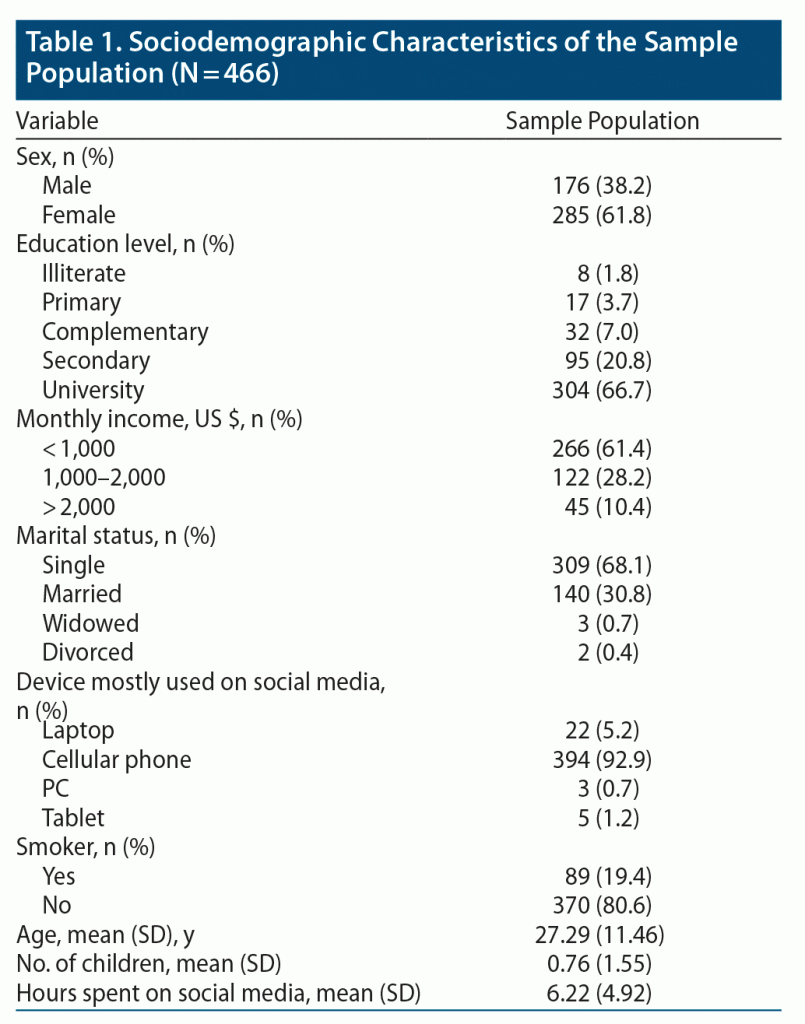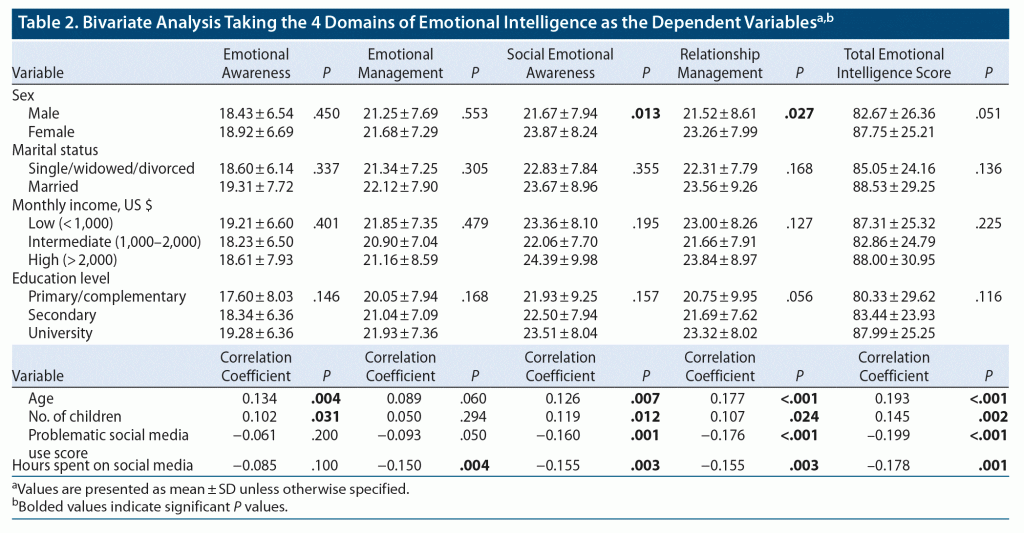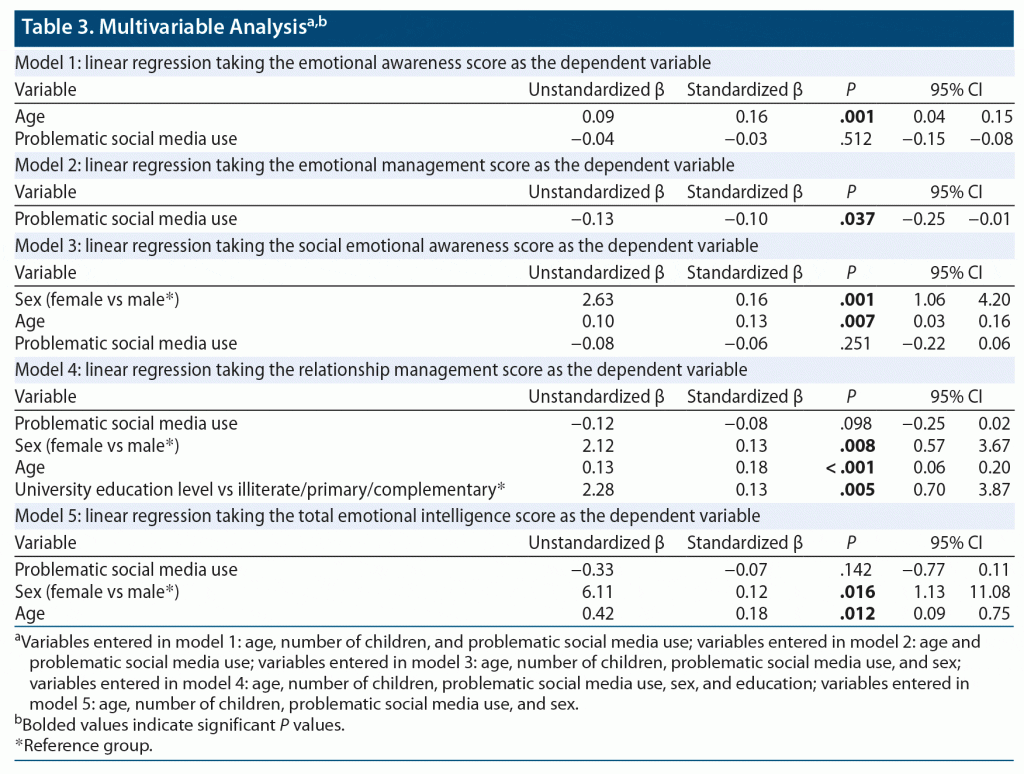ABSTRACT
Objective: To show the impact of problematic social media use (PSMU) on the 4 domains of emotional intelligence (emotional management, emotional awareness, social emotional awareness, and relationship management) among the Lebanese population.
Methods: This cross-sectional study enrolled 466 adults (January–May 2019). The Social Media Disorder Scale and Quick Emotional Intelligence Self-Assessment were used to assess problematic social media use and emotional intelligence, respectively.
Results: Higher PSMU was significantly associated with lower emotional management scores (β = −0.13), but not emotional awareness, social emotional awareness, relationship management, or total emotional intelligence scores. Female sex and older age were associated with higher social emotional awareness (β = 2.63 and β = 0.10, respectively) and relationship management (β = 2.12 and β = 0.13, respectively) scores.
Conclusions: This study showed that higher PSMU was related to lower emotional intelligence. Future prospective studies are needed to gain an understanding of the relationship between PSMU and each component of emotional intelligence, as well as the mediating factors in such associations.
Prim Care Companion CNS Disord 2022;24(5):21m03139
To cite: Kahwagi R-M, Sfeir E, Barbar S, et al. Investigating the relationship between the use of problematic social networks and emotional intelligence in a sample of Lebanese adults. Prim Care Companion CNS Disord. 2022;24(5):21m03139.
To share: https://doi.org/10.4088/PCC.21m03139
© 2022 Physicians Postgraduate Press, Inc.
aSchool of Medicine and Medical Sciences, Holy Spirit University of Kaslik, Jounieh, Lebanon
bDepartment of Research, Psychiatric Hospital of the Cross, Jal Eddib, Lebanon
cSchool of Health Sciences, Modern University for Business and Science, Beirut, Lebanon
dSchool of Pharmacy, Lebanese International University, Beirut, Lebanon
eSocial and Education Sciences Department, School of Arts and Sciences, Lebanese American University, Jbeil, Lebanon
‡Drs Kahwagi and Sfeir are first coauthors. Drs Hallit and Obeid share senior authorship.
*Corresponding author: Souheil Hallit, PharmD, MSc, MPH, PhD, School of Medicine and Medical Sciences, Holy Spirit University of Kaslik, PO Box 446, Jounieh, Lebanon ([email protected]) and Sahar Obeid, PhD, Social and Education Sciences Department, School of Arts and Sciences, Lebanese American University, Jbeil, Lebanon ([email protected]).
Emotional intelligence is a term used to describe a person’s capacity to identify, understand, and react to his/her own and others’ feelings.1 Emotional intelligence is divided into 4 domains: self-awareness, self-management, social awareness, and relationship management.2 Self-awareness is the ability to understand how we feel, what made this feeling come alive, and how our emotions can influence others.3 Self-management is the ability of a person to control his/her feelings and actions to stay focused and reach the desired goal.1 Social awareness is the capacity of a person to use empathy to sense others’ feelings and thoughts and consequently act based on these readings.2 Relationship management is the social interaction that comes from understanding our own and others’ feelings and actions.1
Many factors affecting emotional intelligence have been previously described.1 Currently, a large part of interpersonal interactions and relationships occurs via social media. Emotional intelligence has been described as a factor that enables people to take control of when and how they use social media.4 People presenting with problematic social media use (PSMU) tend to have problems with emotional behaviors and in decoding facial expressions, as well as difficulty coping with negative emotions.5 PSMU is described as a maladaptive pattern of social media use in which a person expresses a strong motivation to use social media and devotes endless time to it. This can lead to impairments in social life and everyday activities, psychological health, and well-being.6 Although PSMU is still not acknowledged as a disease in the latest version of the DSM-5, there is empirical evidence suggesting that PSMU is an emerging mental health problem, particularly among adolescents.7 Research has shown that 71% of teenagers can access more than one social networking site, and 24% are constantly online because of (1) the easy access via smartphone and internet availability and (2) the different activities social media gives access to (ie, mailing, blogging, chatting, dating, learning).8–12
PSMU can result from the interaction of many risk factors and can be linked to lower levels of emotional intelligence, which has been described as a predisposing factor.13 People with low social competencies find themselves with a tendency to use online social interactions,14 which can lead to a compulsive use of internet communication tools.15 In addition, PSMU is also being considered as one of the factors that can influence emotional intelligence.16 Thus, PSMU may be seen as a double-edged sword that can improve emotional intelligence by enhancing creativity and strategic thinking, but also increase aggressive behavior and school dropout rates and have a negative impact on family dynamics.17
Women have been shown to have higher empathy levels than men18 and to be better at recognizing others’ emotions by noticing their facial expression and tone.19 Other findings have demonstrated that emotional intelligence increases with older age20 and is correlated with less mental health issues21–25 and burnout26 and higher self-esteem.27
The Middle East is known to have a high level of social media usage despite the limited number of countries with advanced economies. Lebanon has experienced a huge increase in smartphone use, internet accessibility,28,29 and, consequently, social media use. In 2017, 80% of Lebanese adults had a smartphone with internet access compared to 57% in 2015.30 Furthermore, Lebanon ranked first among Middle Eastern countries in terms of rate of increased internet use since 2015; 72% of Lebanese adults reported using social media in 2017 compared to only 53% of French adults and 20% of Indian adults.31 Therefore, it is important to better understand the dangers associated with misuse of this technology, in particular the association between PSMU and emotional intelligence, given that emotional intelligence is the foundation on which every behavior and interaction is constructed. There have been no studies, to our knowledge, conducted in Lebanon for this purpose. The objective of this study was to investigate the relationship between the use of problematic social networks and emotional intelligence in a sample of Lebanese adults.
METHODS
Study Design and Participants
This cross-sectional study was conducted between January and May 2019. A total of 466 residents of the community were randomly selected from Lebanon’s districts at a proportionate rate. The districts are divided into subdistricts/Caza (stratum), which in turn are subdivided into villages. We chose 2 villages per Caza from a list compiled by the Central Agency of Statistics in Lebanon. We then randomly distributed the questionnaire to the households while applying a random-sampling procedure to choose which houses would be included. Face-to-face interviews were assigned to participants to complete the questionnaire. All individuals aged ≥ 18 years were allowed to take part in the study. Those who failed to complete the questionnaire and those suffering from mental illness or dementia (as reported by a family member) were excluded from the study. The methodology used in this study is similar to that used previously.11,32–34 The Psychiatric Hospital of the Cross Ethics and Research Committee approved the study protocol in compliance with the hospital’s Regulatory Research Protocol (HPC-004-2019). Written consent was obtained from each participant.
Minimal Sample Size Calculation
According to the G-power software, and based on an effect size of f2 = 2%, an α error of 5%, a power of 80%, and taking into consideration 10 factors to be entered in the multivariable analysis, the results showed that a minimal number of 395 participants was needed. A total of 466 residents of 580 (80.34%) participated in the study.
Questionnaire
The completed questionnaire was in Arabic, the native language of Lebanon. The questionnaire was divided into 2 parts: the first part evaluated the sociodemographic characteristics of the participants (age, number of children, sex, education level, socioeconomic level, and marital status). The second part consisted of the following measures.
Social Media Disorder Scale
The Social Media Disorder Scale comprises 27 items to measure the degree of addiction to social media.7 Higher PSMU is reflected by higher scores on the scale. In this study, the Cronbach α of the Social Media Disorder Scale was 0.847.
Quick Emotional Intelligence Self-Assessment
Emotional alertness, emotional control, social emotional awareness, and relationship management are the 4 domains of the Quick Emotional Intelligence Self-Assessment. Each domain is composed of 10 questions, with the answers measured on a 5-point Likert scale, ranging from 0 (never) to 4 (always). Higher emotional intelligence is reflected by higher scores.35 In this study, the Cronbach α for the total emotional intelligence score was 0.936 and for the 4 domains was 0.820 for emotional awareness, 0.851 for emotional management, 0.797 for social emotional awareness, and 0.874 for relationship management.
Translation Procedure
Two clinical psychologists (independent from the study) performed the translation from English to Arabic and vice versa. Discrepancies were resolved by consensus between the translators and researchers.
Statistical Analysis
Data analysis was conducted using SPSS software version 25. Cronbach α values were recorded for reliability analysis for all the scales. The normality of distribution of the emotional intelligence subscale scores was confirmed via a calculation of the skewness and kurtosis; values for asymmetry and kurtosis between −2 and +2 are considered acceptable to prove normal univariate distribution.36 These conditions consolidate the assumptions of normality in samples larger than 300.37 The Student t test was used to compare 2 means, whereas the analysis of variance was used to compare 3 means or more. Pearson correlation test was used for the detection of a linear correlation between continuous variables. Five stepwise linear regressions were conducted, with the emotional intelligence total score and subscale scores used as dependent variables. Confounding factors were eliminated as much as possible by using only important variables in the model with P < .1 in the bivariate analysis. P < .05 was considered significant.
RESULTS
The sociodemographic characteristics of the participants are summarized in Table 1. The mean ± SD age of the participants was 27.29 ± 11.46 years, with 61.8% female. The mean ± SD PSMU score was 8.15 ± 5.71. The mean ± SD emotional intelligence scale and subscale scores were as follows: total emotional intelligence score: 86.08 ± 25.78, emotional awareness: 18.81 ± 6.65, emotional management: 21.57 ± 7.45, social emotional awareness: 23.08 ± 8.19, and relationship management: 22.69 ± 8.27.
Bivariate Analysis
Older age and a higher number of children were significantly associated with more emotional awareness, social emotional awareness, relationship management, and total emotional intelligence. Higher PSMU was significantly associated with less social emotional awareness, relationship management, and total emotional intelligence. Higher mean social emotional awareness and relationship management scores were significant among females compared with males (23.87 vs 21.67, P = .013 and 23.26 vs 21.52, P = .027, respectively) (Table 2).
Multivariable Analysis
The results of a first linear regression, taking the emotional awareness score as the dependent variable, showed that older age (β = 0.09) was significantly associated with more emotional awareness.
The results of a second linear regression, taking the emotional management score as the dependent variable, showed that higher PSMU (β = −0.13) was significantly associated with less emotional management.
The results of a third linear regression, taking the social emotional awareness score as the dependent variable, showed that female sex (β = 2.63) and older age (β = 0.10) were significantly associated with more social emotional awareness.
The results of a fourth linear regression, taking the relationship management score as the dependent variable, showed that female sex (β = 2.12), older age (β = 0.13), and having a university education level compared to complementary level or less (β = 2.28) were significantly associated with higher relationship management scores.
The results of a fifth linear regression, taking the total emotional intelligence score as the dependent variable, showed that female sex (β = 6.11) and older age (β = 0.42) were significantly associated with higher emotional intelligence (Table 3).
DISCUSSION
This study is one of few regarding the relationship between social media use disorder and emotional intelligence. Our study showed that higher PSMU was significantly associated with less emotional management, corroborating previous findings.38,39 A study39 conducted with students showed that PSMU was associated with higher levels of empathy toward peers but also with more difficulty in relying on others and lower emotional intelligence levels overall. These findings are probably due to social isolation, avoidance of real-world interactions, reliance on interactions through social media, and mental exhaustion caused by excessive social media use.39 Many theories have been formulated to explain these findings. Some researchers34,40 noticed that individuals who spend extra time on social media tend to feel lonely and fail to form appropriate relationships with others (ie, have lower emotional intelligence). Previous findings also suggested that individuals with PSMU had lower emotional intelligence, as they were unable to form real-life relationships unless they were developed through social media, which allowed them to promote themselves and feel popular.13 It has also been suggested that social media is used as a way to waste time by those who are unable to adequately control their emotions and set their priorities.16 Unfortunately, there is no sufficient literature investigating the association between the components of emotional intelligence and PSMU, which may be a subject for future studies.
In our study, older age was associated with higher emotional awareness, social emotional awareness, and relationship management, which is in agreement with previous findings.41 With older age, the rate of positive emotions increased, while the rate of negative emotions decreased.42 Other research divided adulthood into younger and older adults and found that older adults had higher emotional intelligence than younger adults43 despite the occurrence of more challenging and inconvenient events with age (increased responsibilities, health problems).41 It might be that the older population had more exposure to life events and challenges and more opportunities to learn how to understand their feelings and practice and develop their coping strategies compared with the younger population.44
Our study also showed that women had higher social emotional awareness and relationship management than men. Previous results showed that women had higher emotional intelligence levels in general,45 as well as more empathy46 and better emotional and interpersonal skills47 than men. Women have better skills decoding facial expressions and expressing feelings. These findings are probably due to differences in how boys and girls are typically raised, as young boys are taught to abstain from expressing their emotions, and girls are expected to be more sensitive and expressive of their emotions.48
Our study showed that having a university degree was associated with better relationship management scores compared to having a low education level. Research demonstrated that higher emotional intelligence levels were strongly related to higher levels of educational success.49 Results regarding each component of emotional intelligence proved that success is affected by the level of development of each component and that improvement in these components can increase the level of educational success.49
Clinical Implications
Our study is important given that social media is spreading worldwide and becoming more available to everyone. PSMU might be considered a new kind of addiction. Acknowledgment of the danger that this addiction has on our emotional state and intelligence is important, as it should motivate parents, schools, family members, and everyone who uses social media to limit the time spent on social networking sites. The results of this study may serve as a first step in Lebanon to educate on the dangers of social media.
Health care professionals (doctors, pharmacists, nurses) play an important role in mental health promotion and well-being by implementing this knowledge in their health promotion activities by (1) recognizing and assessing problematic social media use, (2) understanding the association between PSMU and emotional intelligence, and (3) providing individual support in daily living (use of counseling and cognitive‐behavioral techniques to learn communication skills and how to deal with stressful situations by using effective coping strategies, implementation of mindfulness programs such as mindfulness-based stress reduction, and emphasis on healthy lifestyle).
Limitations
This study was unable to show a causative association between the different variables due to the cross-sectional design. A selection bias is possible given that males were underrepresented in our study, as sex is a factor known to affect emotional intelligence, and people with a high level of education were overrepresented. An information bias is also possible since there might be an overestimation or underestimation of some questions. A residual confounding bias is possible as well since not all factors associated with emotional intelligence were taken into consideration in this study.
CONCLUSION
This study showed that higher PSMU was related to lower emotional intelligence. Future prospective studies are needed to gain a deeper understanding of the relationship between PSMU and each component of emotional intelligence, as well as the mediating factors in such associations.
Submitted: September 13, 2021; accepted January 7, 2022.
Published online: October 4, 2022.
Relevant financial relationships: None.
Funding/support: None.
Acknowledgments: The authors thank all the participants who helped during the project, as well as Dina Dagher, MD, for her help with data collection and entry. Dr Dagher has no relevant financial relationships to disclose.
Clinical Points
- Higher problematic social media use was significantly associated with lower emotional management.
- Female sex and older age were associated with higher social emotional awareness and relationship management scores, respectively.
- Future prospective studies are needed to gain a deeper understanding of the relationship between problematic social media use and each component of emotional intelligence.
References (49)

- Obeid S, Haddad C, Fares K, et al. Correlates of emotional intelligence among Lebanese adults: the role of depression, anxiety, suicidal ideation, alcohol use disorder, alexithymia and work fatigue. BMC Psychol. 2021;9(1):18. PubMed CrossRef
- Matlock D. Understanding the Four Domains of EQ. Duke Matlock website. Accessed September 6, 2022. https://www.dukematlock.com/domains-of-eq/
- Aritzeta A, Mindeguia R, Soroa G, et al. Team emotional intelligence in working contexts: development and validation of the Team-Trait Meta Mood Scale (T-TMMS). Front Psychol. 2020;11:893. PubMed CrossRef
- Abu-Shanab S, Abu-Shanab EA. How students are using social networks?: emotional intelligence as a determinant. Int J Cyber Behav Psychol Learn. 2019;9(1):49–64. CrossRef
- van Deursen AJ, Bolle CL, Hegner SM, et al. Modeling habitual and addictive smartphone behavior: the role of smartphone usage types, emotional intelligence, social stress, self-regulation, age, and gender. Comput Human Behav. 2015;45:411–420. CrossRef
- Shensa A, Escobar-Viera CG, Sidani JE, et al. Problematic social media use and depressive symptoms among US young adults: a nationally representative study. Soc Sci Med. 2017;182:150–157. PubMed CrossRef
- van den Eijnden RJ, Lemmens JS, Valkenburg PM. The Social Media Disorder Scale. Comput Human Behav. 2016;61:478–487. CrossRef
- Lenhart A, Duggan M, Perrin A, et al. Teens, social media and technology overview 2015. Pew Research Center website. Accessed September 6, 2022. https://www.pewresearch.org/internet/2015/04/09/teens-social-media-technology-2015/
- Andreassen CS, Pallesen S, Griffiths MD. The relationship between addictive use of social media, narcissism, and self-esteem: findings from a large national survey. Addict Behav. 2017;64:287–293. PubMed CrossRef
- Griffiths MD. Social networking addiction: emerging themes and issues. J Addict Res Ther. 2013;4(5)e118. CrossRef
- Malaeb D, Salameh P, Barbar S, et al. Problematic social media use and mental health (depression, anxiety, and insomnia) among Lebanese adults: any mediating effect of stress? Perspect Psychiatr Care. 2021;57(2):539–549. PubMed CrossRef
- Youssef L, Hallit R, Akel M, et al. Social media use disorder and alexithymia: any association between the two? results of a cross-sectional study among Lebanese adults. Perspect Psychiatr Care. 2021;57(1):20–26. PubMed CrossRef
- Kircaburun K, Griffiths MD, Billieux J. Trait emotional intelligence and problematic online behaviors among adolescents: the mediating role of mindfulness, rumination, and depression. Pers Individ Dif. 2019;139:208–213. CrossRef
- Asl DN, Mashhadi RT. The relationship between internet addiction with social skill, disorders of anxiety among high school students of Urmia in academic year 2014–2015. Scinzer J Human. 2016;2(1):13–18.
- Casale S, Tella L, Fioravanti G. Preference for online social interactions among young people: direct and indirect effects of emotional intelligence. Pers Individ Dif. 2013;54(4):524–529. CrossRef
- Süral I, Griffiths MD, Kircaburun K, et al. Trait emotional intelligence and problematic social media use among adults: the mediating role of social media use motives. Int J Ment Health Addict. 2019;17(2):336–345. CrossRef
- Applied Social Psychology. “Social Media” Disorder. Penn State University website. Accessed September 6, 2022. https://sites.psu.edu/aspsy/2018/03/16/social-media-disorder/
- Frank CK, Baron-Cohen S, Ganzel BL. Sex differences in the neural basis of false-belief and pragmatic language comprehension. Neuroimage. 2015;105:300–311. PubMed CrossRef
- Kret ME, De Gelder B. A review on sex differences in processing emotional signals. Neuropsychologia. 2012;50(7):1211–1221. PubMed CrossRef
- Dhillon SK. Emotional intelligence: a comparative study on age and gender differences. Int J Basic Appl Res. 2018;8(9)670–681.
- Obeid S, Akel M, Haddad C, et al. Factors associated with alexithymia among the Lebanese population: results of a cross-sectional study. BMC Psychol. 2019;7(1):80. PubMed CrossRef
- Obeid S, Akel M, Haddad C, et al. Factors associated with alcohol use disorder: the role of depression, anxiety, stress, alexithymia and work fatigue- a population study in Lebanon. BMC Public Health. 2020;20(1):245. PubMed CrossRef
- Obeid S, Lahoud N, Haddad C, et al. Factors associated with depression among the Lebanese population: results of a cross-sectional study. Perspect Psychiatr Care. 2020;56(4):956–967. PubMed CrossRef
- Obeid S, Lahoud N, Haddad C, et al. Factors associated with anxiety among the Lebanese population: the role of alexithymia, self-esteem, alcohol use disorders, emotional intelligence and stress and burnout. Int J Psychiatry Clin Pract. 2020;24(2):151–162. PubMed CrossRef
- Zakhour M, Haddad C, Sacre H, et al. Suicidal ideation among Lebanese adults: scale validation and correlates. BMC Psychiatry. 2021;21(1):100. PubMed CrossRef
- Lahoud N, Zakhour M, Haddad C, et al. Burnout and its relationships with alexithymia, stress, self-esteem, depression, alcohol use disorders, and emotional intelligence: results From a Lebanese cross-sectional study. J Nerv Ment Dis. 2019;207(8):642–650. PubMed CrossRef
- Obeid S, Haddad C, Zakhour M, et al. Correlates of self-esteem among the Lebanese population: a cross-sectional study. Psychiatr Danub. 2019;31(4):429–439. PubMed CrossRef
- Dib JE, Haddad C, Sacre H, et al. Factors associated with problematic internet use among a large sample of Lebanese adolescents. BMC Pediatr. 2021;21(1):148. PubMed CrossRef
- Obeid S, Saade S, Haddad C, et al. Internet addiction among lebanese adolescents: the role of self-esteem, anger, depression, anxiety, social anxiety and fear, impulsivity, and aggression-a cross-sectional study. J Nerv Ment Dis. 2019;207(10):838–846. PubMed CrossRef
- Dennis E, Martin J, Wood R, et al. Media Use in the Middle East 2017: A Seven-Nation Survey. Qatar: Northwestern University; 2017.
- Poushter J, Bishop C, Chwe H. Social Media Use Continues to Rise in Developing Countries but Plateaus Across Developed Ones. Pew Research Center; 2018:22.
- Barbar S, Haddad C, Sacre H, et al. Factors associated with problematic social media use among a sample of Lebanese adults: the mediating role of emotional intelligence. Perspect Psychiatr Care. 2021;57(3):1313–1322. PubMed
- Dagher M, Farchakh Y, Barbar S, et al. Association between problematic social media use and memory performance in a sample of Lebanese adults: the mediating effect of anxiety, depression, stress and insomnia. Head Face Med. 2021;17(1):6. PubMed CrossRef
- Youssef L, Hallit R, Kheir N, et al. Social media use disorder and loneliness: any association between the two? results of a cross-sectional study among Lebanese adults. BMC Psychol. 2020;8(1):56. PubMed CrossRef
- Mohapel P. The Quick Emotional Intelligence Self-Assessment. Accessed September 6, 2022. http://www.cafaweb.com/sites/default/files/eq-self-assessment_0.pdf
- George D. SPSS for Windows Step by Step: A Simple Study Guide and Reference, 17.0 Update, 10/e. Pearson Education India; 2011.
- Mishra P, Pandey CM, Singh U, et al. Descriptive statistics and normality tests for statistical data. Ann Card Anaesth. 2019;22(1):67–72. PubMed CrossRef
- Kant R. Relationship of internet addiction with emotional intelligence among youths. GESJ: Educ Sci Psychol. 2018;48(2)39–47.
- AbdelKader W, Elnakeeb M. The relationship between the use of media and emotional intelligence among youth nursing students. J Nurs Health Sci. 2017;6(5):63–77.
- Yavich R, Davidovitch N, Frenkel Z. Social media and loneliness: forever connected? Higher Education Studies. 2019;9(2):10–21. CrossRef
- Chen Y, Peng Y, Fang P. Emotional intelligence mediates the relationship between age and subjective well-being. Int J Aging Hum Dev. 2016;83(2):91–107. PubMed CrossRef
- Schweizer S, Stretton J, Van Belle J, et al; Cam-CAN. Age-related decline in positive emotional reactivity and emotion regulation in a population-derived cohort. Soc Cogn Affect Neurosci. 2019;14(6):623–631. PubMed CrossRef
- Delhom I, Satorres E, Meléndez JC. Can we improve emotional skills in older adults? emotional intelligence, life satisfaction, and resilience. Interv Psicosoc. 2020;29(3):133–139. CrossRef
- Ross JG, Myers SM. The current use of social media in undergraduate nursing education: a review of the literature. Comput Inform Nurs. 2017;35(7):338–344. PubMed
- Meshkat M, Nejati R. Does emotional intelligence depend on gender? a study on undergraduate English majors of three Iranian universities. SAGE Open. 2017;7(3):2158244017725796. CrossRef
- Strekalova YA, Kong S, Kleinheksel AJ, et al. Gender differences in the expression and cognition of empathy among nursing students: an educational assessment study. Nurse Educ Today. 2019;81:1–6. PubMed CrossRef
- Petrovici A, Dobrescu T. The role of emotional intelligence in building interpersonal communication skills. Procedia Soc Behav Sci. 2014;116:1405–1410. CrossRef
- Wen Y, Chen H, Pang L, et al. The relationship between emotional intelligence and entrepreneurial self-efficacy of Chinese vocational college students. Int J Environ Res Public Health. 2020;17(12):4511. PubMed CrossRef
- Suleman Q, Hussain I, Syed MA, et al. Association between emotional intelligence and academic success among undergraduates: a cross-sectional study in KUST, Pakistan. PLoS One. 2019;14(7):e0219468. PubMed CrossRef
Enjoy this premium PDF as part of your membership benefits!







